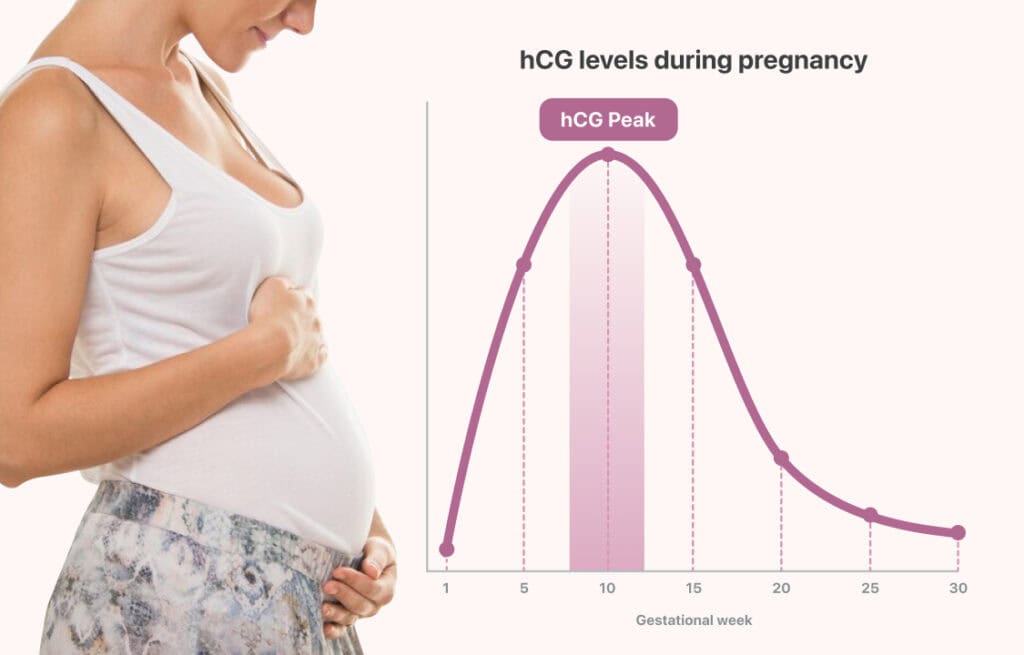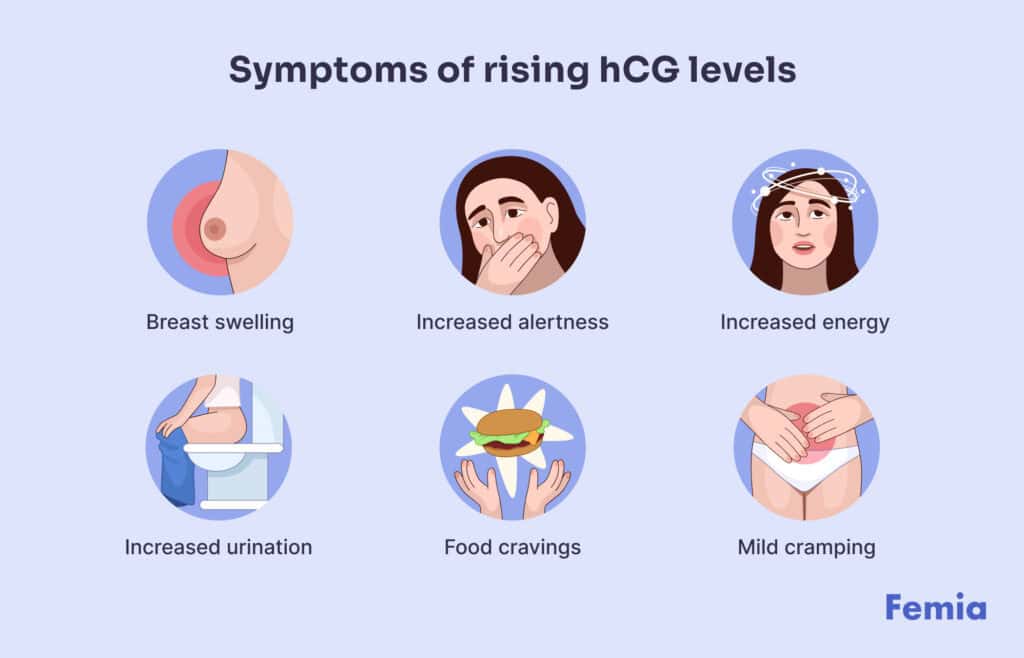Femia > Health Library > Pregnancy > Pregnancy health > Symptoms of rising hCG levels: What they mean and why they matter
Symptoms of rising hCG levels: What they mean and why they matter

- Updated Feb 11, 2025
- Published
CRAFTED BY HUMAN
Crafted by human At Femia, we provide accurate and up-to-date information at every stage of your journey, from trying to conceive, pregnancy and postnatal support. All content is created by a real person based on in-depth research and own professional experience. Femia ensures that you will receive expert advice, strict accuracy and a personalized approach from our authors/medical experts. Learn more about our editorial policy.
FACT CHECKED
Fact checked At Femia Health, we maintain the highest standards of editorial excellence in delivering content focused on helping you conceive, guiding you through pregnancy, and supporting you postpartum. Explore our content review principles to learn how we ensure the accuracy and quality of our health and lifestyle tips for every stage of your journey.
- Human chorionic gonadotropin (hCG) is the first hormone that rises rapidly during the first trimester of pregnancy. It stimulates the production of other fertility hormones, like progesterone, to thicken the uterine lining and support the development of the embryo.
- The common symptoms of rising hCG levels that indicate a healthy pregnancy include nausea and vomiting, fatigue, mild cramping, and breast tenderness.
- hCG levels begin to rise after implantation and appear in blood and urine 6-10 days after implantation. The hCG levels are typically the highest at around the 8th to 10th week of pregnancy and decline afterward.
Human chorionic gonadotropin (hCG) is a hormone produced by a woman’s placenta during pregnancy. The placenta produces hCG hormone after the fertilized egg implants in the uterine lining, and the levels of hCG continue to rise up until the first 8 to 10 weeks of pregnancy.
Rising hCG is a key indicator of a progressing pregnancy, and it often comes with physical symptoms like breast tenderness, nausea, and fatigue among others. Let’s discuss the symptoms of rising hCG levels in detail and what they indicate in pregnancy.
Our pregnancy symptoms tracking app helps you log
and monitor unusual changes
What is hCG, and why is it important?
hCG hormone is produced by a woman’s placenta (womb) shortly after fertilization. It is the first hormone to rise during pregnancy, indicating a positive pregnancy. The hormone plays a vital role in establishing and maintaining pregnancy.
hCG induces the production of other fertility hormones, like progesterone, which develops the uterine lining and helps the fetus grow. It also helps with embryo implantation and survival.
What rising hCG levels mean for pregnancy health
Rising hCG levels during early pregnancy commonly indicate a healthy pregnancy. The hCG levels typically double every two days during the first four weeks of pregnancy and peak by the 10th week, showing a healthy conception.
A slow or irregular rise in hCG levels can mean that your pregnancy is not viable and indicate conditions like miscarriage or an ectopic pregnancy. The chances of miscarriage if hCG levels are rising are typically low. However, a miscarriage is more likely if hCG levels don’t double or show irregular rises, especially when accompanied by symptoms such as cramping and vaginal bleeding.
Symptoms of rising hCG levels

The symptoms of rising hCG levels and their severity can vary from woman to woman as every female’s body and its response is different. Hence, it’s normal for the symptoms to differ from one pregnancy to another.
The common symptoms of rising hCG or early pregnancy can include:
- Breast swelling
- Nausea and vomiting
- Fatigue or dizziness
- Increased urination
- Food cravings
- Mild cramping
👉Find out more: Can you be pregnant and still have a period? Understanding bleeding during pregnancy
hCG levels by week: What’s normal?
The hCG levels can vary widely in each individual as every pregnancy is unique. The normal hCG levels by week in pregnancy commonly range between:
- During the first 6-10 days of conception or until the 4th week of pregnancy, hCG levels are typically the lowest. The average hCG levels in blood during the first four weeks of pregnancy range between 0 – 750 µ/L.
- After 10 days of conception or the 5th week of pregnancy, the hCG levels begin to rise. The average hCG levels in blood by the 5th week of pregnancy is 200 – 7,000 µ/L.
- The average hCG levels in the blood by the 6th week of pregnancy is around 200 – 32,000 µ/L.
- The average hCG levels in blood by the 7th week of pregnancy ranges between 3,000 – 160,000 µ/L.
- So, when do hCG levels peak? The hCG levels are typically the highest around the 8th to 10th week of pregnancy or towards the end of the first trimester. The average hCG levels in blood by the 8th-12th week of pregnancy ranges between 32,000 – 210,000 µ/L.
- By the 13th week or third trimester of pregnancy, hCG levels begin to decline and gradually decrease through the remaining pregnancy. It ranges between 9,000-60,000 µ/L.
Our pregnancy symptoms tracking app helps you log
and monitor unusual changes
When do hCG levels rise and peak?
When do hCG levels rise, or do they remain elevated from the beginning of pregnancy? hCG levels are typically low right after conception, but they begin to rise 6-10 days after embryo implantation, which is during the 4th week of pregnancy.
By the 8th-11th week of pregnancy, hCG levels peak and remain the highest until the end of the first trimester. As the hCG levels begin to rise, the onset of typical pregnancy symptoms – particularly nausea, vomiting, and fatigue peak.
What hCG level indicates pregnancy?
So, what hCG level indicates pregnancy? Here is a general guideline about hCG levels in pregnant and non-pregnant women:
- Non-pregnant woman: Less than 5 mIU/mL.
- Pregnant woman: 25 mIU/mL or higher.
- Levels of hCG doubling every two to three days indicate a progressing pregnancy.
How to increase hCG levels in early pregnancy
So, how to increase hCG levels in early pregnancy? Is it possible? Although the rise in hCG levels is a natural process that continues throughout the first trimester, a healthy diet and lifestyle can help the body support an early pregnancy. For example:
- Maintain a healthy diet rich in iron and folate, like leafy greens, liver, red meat, eggs, nuts and seeds, beans, peas, citrus fruits, papayas and avocados.
- Ensure regular intake of 8 glasses of water.
- Avoid intense exercise and engage in light to moderate exercise and movement, like walking and yoga.
- Reduce stress by engaging in positive activities, like reading, talking to a friend, baking or cooking, deep breathing or walking on grass.
- Follow prenatal care recommendations, and don’t miss the intake of supplements and vitamins prescribed by your doctor.
Chances of miscarriage if hCG levels are rising
The chances of miscarriage if hCG levels are rising are typically low and unlikely. Steadily rising hCG levels are a positive sign of a progressing pregnancy. However, if hCG levels fluctuate or drop abnormally, it could indicate complications, like miscarriage or ectopic pregnancy, which should be further evaluated.
As each pregnancy and woman’s body is unique, hCG levels and what they indicate can vary from person to person. This underscores the need for regular medical checkups, ultrasounds, and hCG level monitoring to ensure a healthy pregnancy, particularly during the first trimester. This is because the chances of miscarriage during the initial weeks of pregnancy are the highest.
👉Find out more: Danger signs of pregnancy in the second trimester: What to watch for and when to call your doctor
When to consult a doctor
You should consult a doctor about your hCG levels if:
- Your hCG levels are rising too slowly.
- Your symptoms of rising hCG levels are severe and interfere with your daily life.
- You experience abnormal symptoms, like, among others, vaginal bleeding, excessive cramping, and fatigue.
During the first 8-10 weeks of pregnancy, opt for routine hCG testing as a part of early prenatal care.
Questions from the Femia community
Does a higher hCG level mean a healthier pregnancy?
No, not necessarily. A high hCG level isn't enough to confirm that the pregnancy is healthy, as a rising hCG level provides limited information about pregnancy. Moreover, hCG levels can vary widely between pregnant women. An increasing hCG level can indicate that the pregnancy is progressing, and highly elevated levels of hCG can indicate a twin or molar pregnancy, but an ultrasound is necessary to confirm this.
Can stress affect hCG levels?
Yes, according to the National Library of Medicine, stress can affect placental hCG secretion, which can impair early pregnancy development.
What happens if hCG levels rise too slowly?
If hCG levels rise too slowly, particularly after the 4th week of pregnancy, it can indicate a miscarriage or an ectopic pregnancy. However, further medical evaluation is necessary to confirm the exact cause.
Can you raise hCG levels naturally?
No, you cannot raise hCG levels naturally as the body increases the hCG hormone on its own until the 12th week if the pregnancy progresses. Maintaining a healthy lifestyle and diet can support the overall success of the pregnancy.
The bottom line
Rising hCG levels during the first 8-12 weeks is a positive sign of a progressing pregnancy and is often accompanied by other symptoms, like nausea and vomiting, fatigue, mild cramping, and drowsiness.
So, what hCG level indicates pregnancy? An hCG level of 25 mIU/mL or higher indicates a positive pregnancy, and when the level starts to double every two to three days, it indicates that your pregnancy is progressing.
However, if your hCG levels fluctuate or drop unusually or if you experience symptoms like vaginal bleeding or severe cramping, you are recommended to consult your healthcare provider for a detailed medical evaluation.
Moreover, to support a healthy pregnancy, it is essential to maintain a healthy diet rich in iron and folate, follow prenatal care recommendations, take prescribed supplements, get adequate rest, and keep yourself hydrated.
References
- Healthdirect Australia. “hCG Levels.” Pregnancy Birth and Baby, 17 July 2023, www.pregnancybirthbaby.org.au/hCG-levels.
- Tal, Joseph, et al. “Stress-related Hormones Affect Human Chorionic Gonadotrophin Secretion From the Early Human Placenta in Vitro.” Human Reproduction, vol. 6, no. 6, July 1991, pp. 766–69. https://doi.org/10.1093/oxfordjournals.humrep.a137425.
- Koletzko, Berthold, et al. “Diet and Lifestyle Before and During Pregnancy – Practical Recommendations of the Germany-wide Healthy Start – Young Family Network.” Geburtshilfe Und Frauenheilkunde, vol. 78, no. 12, Sept. 2018, pp. 1262–82. https://doi.org/10.1055/a-0713-1058.
editor. “What Are hCG Levels?” American Pregnancy Association, 20 Sept. 2023, americanpregnancy.org/getting-pregnant/hCG-levels.

Wondering if you can eat blue cheese while pregnant? Learn when blue cheese is safe, how to check for pasteurization, and guidelines for enjoying it during pregnancy.

Discover premature baby development week by week. Learn key milestones with our comprehensive chart. Expert insights on preemie growth from Femia.

When do you go to the hospital for labor? Discover common signs of labor and learn how to distinguish early signs from active labor to find the answer.

